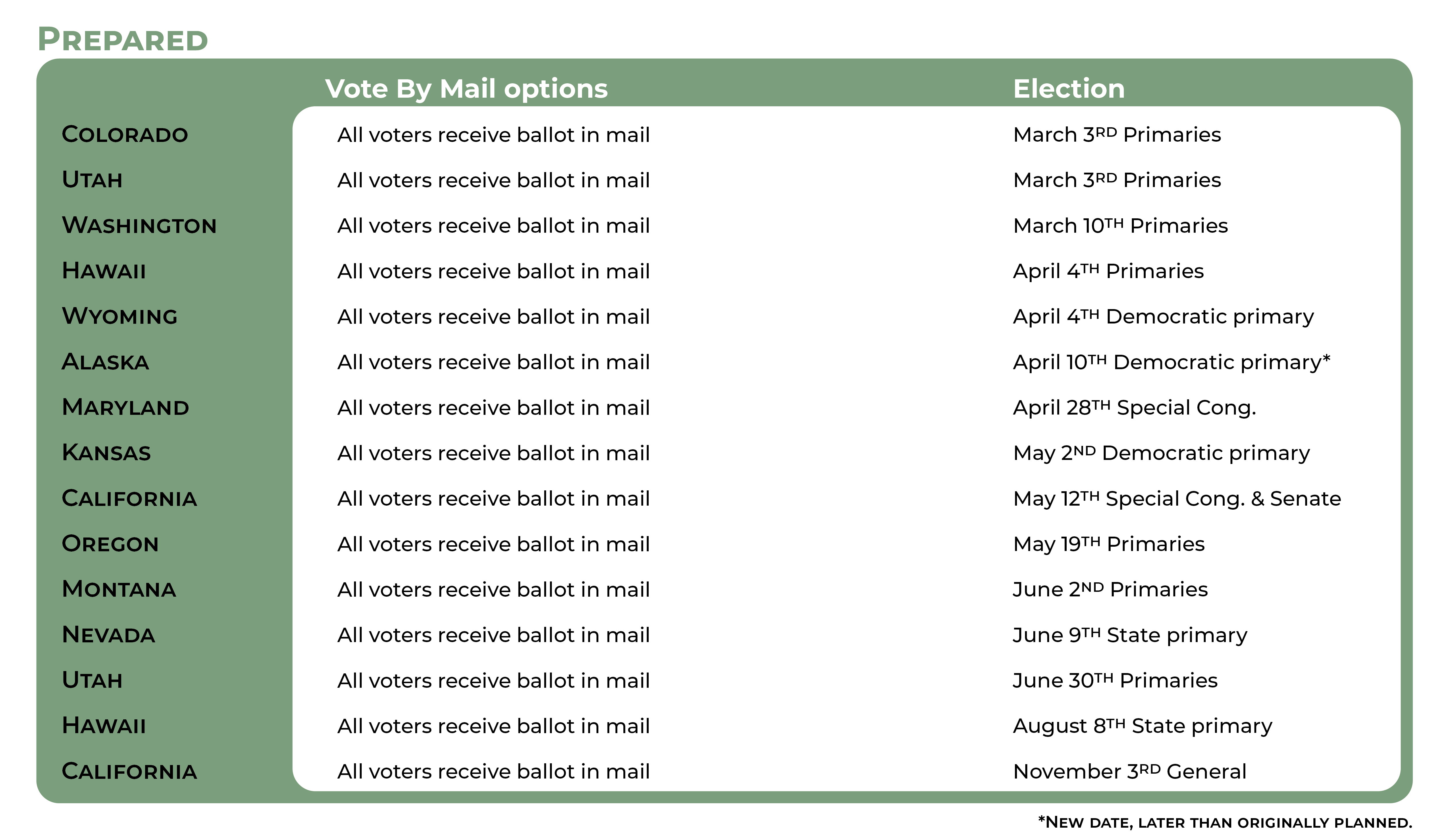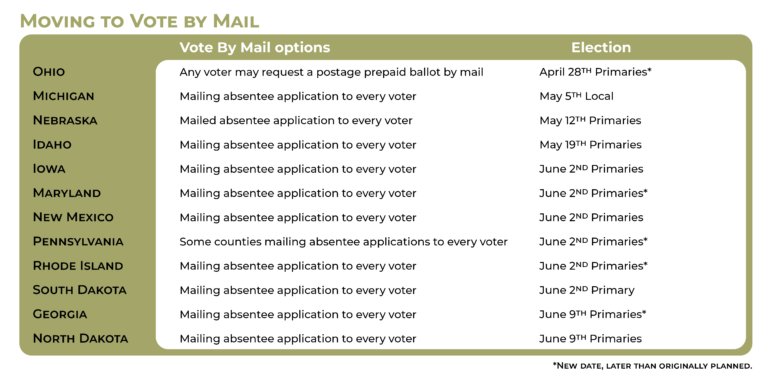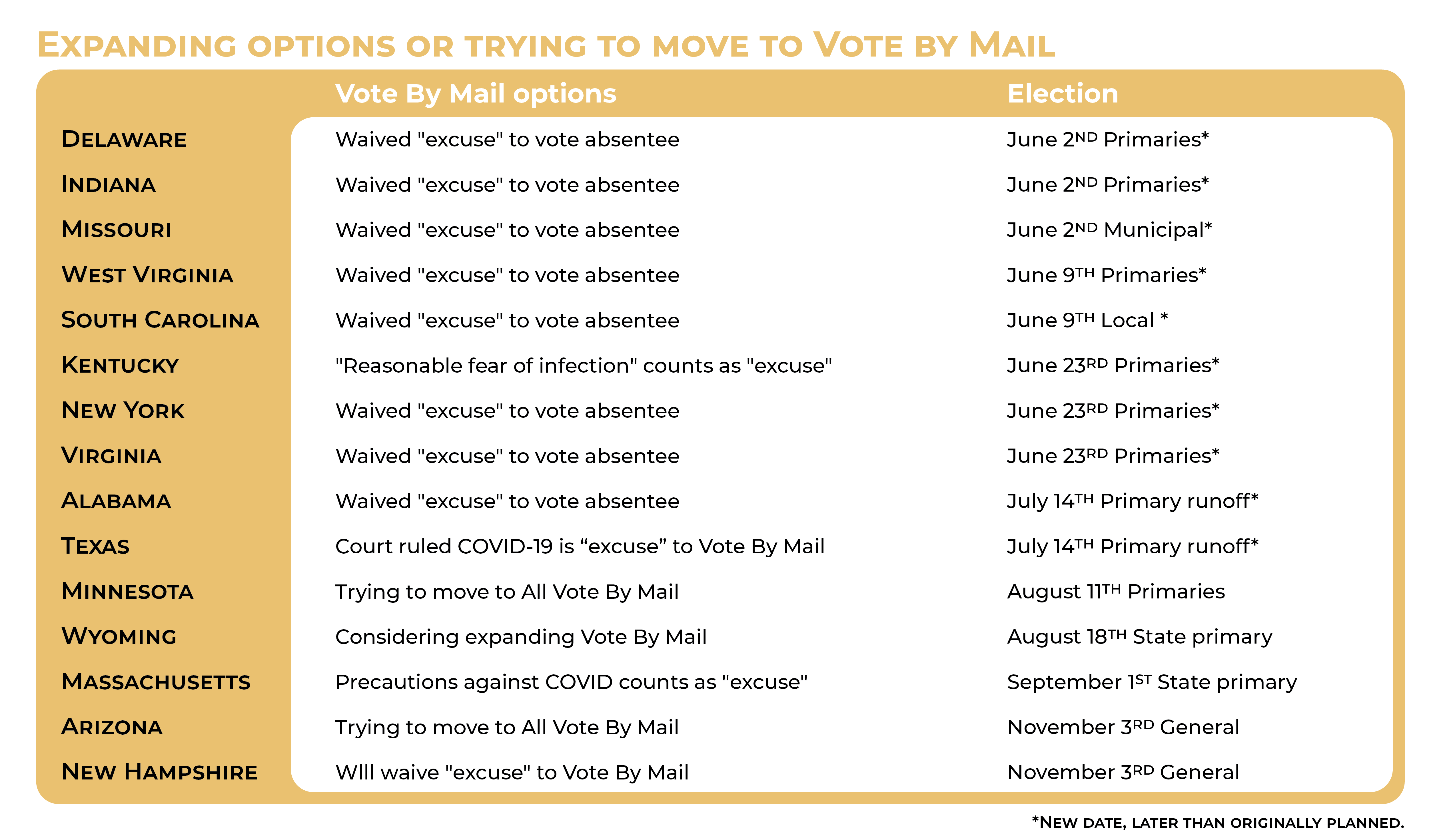Editor’s note, 5/26: We are updating our coronavirus election readiness tracker as state leaders and elections officials navigate the political and logistical obstacle course that stands between today’s status quo and Election Day 2020. The debacle in Wisconsin, where voters and poll workers were exposed to COVID-19 after being forced to go to in-person polling places on election day, has spurred action in other states to keep elections and voters safe. Montana and Nevada have joined the ranks of states who will mail ballots to all voters for their primary elections. In many other states—Michigan, Nebraska, Idaho, Iowa, Maryland, New Mexico, Rhode Island, South Dakota, North Dakota, Georgia, Pennsylvania—the legislature has not been willing to go that far, but lawmakers or Secretaries of State are mailing absentee applications to every voter. This is a proven strategy—two cities in Wisconsin mailed out application forms before the April primary, and had the highest rates of voting by mail in the state.
As Americans are maintaining physical distance from each other to protect themselves and slow the spread of coronavirus, some states are better prepared than others to continue holding safe, fair elections. States’ preparation for and response to the global pandemic could have major consequences for voters’ ability to participate in their democracy, both in primary elections this spring and for the presidential election this fall. We are tracking states’ preparedness. Ideally, every voter would have the choice to cast a mailed-out ballot from the safety of their home. We are monitoring which states are prepared, which are taking taking baby steps, and which are leaving voters to fend for themselves at the polls.
Prepared
Some states were prepared for a coronavirus election well before the pandemic: they already mailed out ballots to all voters letting them return the ballot in the mail or at a secure drop-off site. In those states, democracy is not disrupted.
Others, like Nevada, Montana, and California, have moved to send ballots to all registered voters to ensure that everyone may safely vote from home.

Getting prepared for coronavirus election safety: Helping Voters Request an Absentee Ballot
Other states are taking emergency steps to mail absetnee ballot applications to all registered voters. For example, registered voters in Georgia, Idaho and Michigan who are not yet signed up to vote by mail will receive an application in the mail. Pennsylvania legislators blocked a bill to mail applications to registered voters, but some county clerks are mailing applications to registered voters in their jurisdiction. Voters still must fill out the application and submit it in order to receive a ballot in the mail. The Ohio board of elections paid for postage prepaid return envelopes, making it easy for voters to return their ballot.

Expanding options or trying to move to Vote By Mail
Most of the states that require voters to have an “excuse to request an absentee ballot have temporarily waived or loosened that requirement in the face of coronavirus. Wanting to vote conveniently and safely without spreading pandemic in your community is excuse enough. Those states are likely to see an uptick in voter requests for mailed-out ballots for their upcoming coronavirus election, but this step in the right direction might not go far enough to ensure everyone can safely vote in May or June.
Election officials in Arizona (Secretary of State and county election directors), Minnesota (Secretary of State), and New Mexico (27 of 33 county clerks) are pushing to be allowed to mail ballots to every registered voter. Officials in Wyoming are considering how to expand voting by mail.

Expecting more voters to request absentee ballots
Seven states with upcoming elections already allowed any voter to request an absentee ballot for any reason. Two of these (North Carolina and New Jersey) have delayed the election date, giving more voters a chance to request a mailed-out ballot, and election administrators a chance to prepare for a surge in absentee votes.

Forcing most voters to vote in-person
Four states with upcoming elections only let voters request an absentee ballot if they have an “excuse,” such as being disabled. Although five of these states have delayed their election, the delay won’t help most voters, who will still eventually be forced to choose between risking their health at an in-person polling place or not exercising their right to vote. If these states want to keep their voters and elections safe, they should follow the examples of Delaware, West Virginia, Indiana, Alabama, Virginia, and New Hampshire and waive the “excuse.”

Threw voters to the wolves
Then there’s Wisconsin. Wisconsin chose not to delay the primary and not to make it easier for voters to vote from home. This created mass confusion as voters were faced with conflicting messages from state officials: stay home to protect your community from a deadly virus, or go wait in line for hours in a public place to exercise your fundamental right to vote.

See also: Our FAQ on pandemic-proof elections with Vote By Mail and a snapshot of which states are leading and which states are falling short when it comes to conducting safe, fair elections as the COVID-19 crisis continues to unfold this fall.
Kristin Eberhard is a director at Sightline Institute. She researches, writes about, and speaks about elections systems and democracy reform, with particular expertise on Vote By Mail and proportional representation. Eberhard lives in Oregon, an all-Vote By Mail state. She is available to discuss tested, safe, fair COVID-19 election practices, state by state. For interviews, speaking engagements, and media inquiries, contact Anna Fahey. Find all Eberhard’s latest research here.

